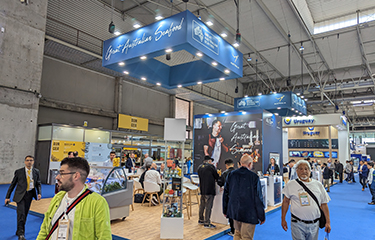A free trade agreement between Australia and the United Kingdom will soon enter into force, and Australia’s seafood industry anticipates the agreement will create new opportunities and sales.
The U.K.-Australia free trade agreement was signed in December 2021, six months after an “agreement in principle” was established. The agreement was the first major post-Brexit trade deal negotiated by the U.K., and after a lengthy bureaucratic process, the trade deal has been ratified and will enter into force on 31 May.
The agreement will eliminate all tariffs on Australian seafood exports to the U.K. over a multi-year period. Tariffs on lobster and finfish will be eliminated as soon as the trade deal enters into force.
“This move will help to increase the competitiveness of Australian seafood in the U.K. market and will provide new opportunities for Australian seafood companies to expand their international operations and diversify markets,” Seafood Industry Australia CEO Veronica Papacosta said in a release.
Currently, the U.K. is a relatively small market for Australia – the country exported just AUD 720,000 (USD 486,754, EUR 443,988) worth of seafood to the country in the 2020 – 2021 period, according to the SIA, a number it expects will be “significantly boosted” by the trade deal.
In advance of the trade deal finally coming into force, Australia hosted a country pavilion at Seafood Expo Global – which took place from 25 to 27 April in Barcelona, Spain – for the first time. Austrade, short for the Australian Trade and Investment Commission, helped facilitate the new pavilion. A governmental promotion agency, Austrade helps promote Australian products – including seafood – internationally.
Officials with Austrade told SeafoodSource during Seafood Expo Global they anticipate the trade deal will provide Australian seafood companies with a new market for their unique seafood. Austrade E.U. Marketing Manager Karin Van Wesep told SeafoodSource that establishing a country pavilion was part of the industry looking to capitalize on increased opportunities coming from trade agreements.
“We see a lot of opportunity coming through trade agreements for the U.K. – and down the line also for E.U. trade agreements,” she said.
Austrade Trade Investment Commissioner Ana Nishnianidze told SeafoodSource that while a trade deal with the E.U. is a ways off, its potential is already “creating the energy and excitement” around trade between the bloc and Australia, Nishnianidze said.
Even without a trade deal, Australia has key advantages it can leverage when seeking greater market share in the U.K. and the E.U., she added.
“Because we have quite a unique region, because of the seas and the temperatures, we do have quite a few varieties of seafood that are unique to the Australian coast,” she said. “We’re not here to compete with salmon.”
Australia is home to species like kingfish and toothfish, highly sustainable octopus fisheries, and more.
The high sustainability of the country’s seafood, Nishnianidze said, will also give it an extra leg up in the E.U. and U.K. Australia is home to an MSC-certified lobster fishery that holds the honor of being the first fishery to ever earn certification through the program.
“In this day and age it’s not just about food, it’s about looking at how it has been produced, how it’s sourced, how it’s traveled, how it’s packaged,” she said. “We’ve realized that a lot of things that Australia is valuing around sustainability and doing business with secure long-term partners is also something that is really valued in Europe.”
Van Wesep said Austrade is planning to increase its emphasis on the U.K. and the European market, and is doing more trade work specific to the region as trade deals enhance the country’s competitiveness – especially in the premium product space.
“We think we’re a good fit to partner with buyers across the European markets,” Nishnianidze said.
Photo by Chris Chase/SeafoodSource







